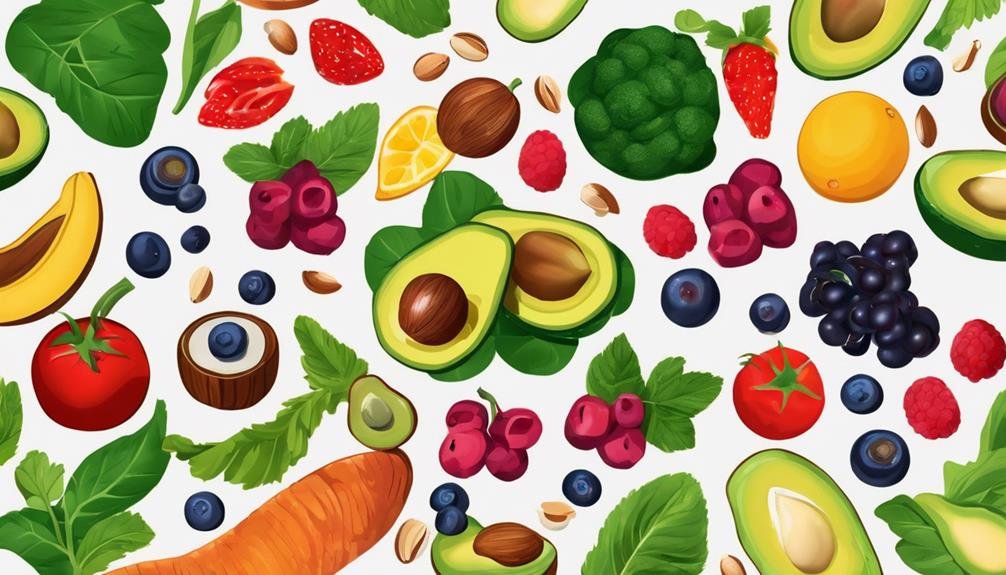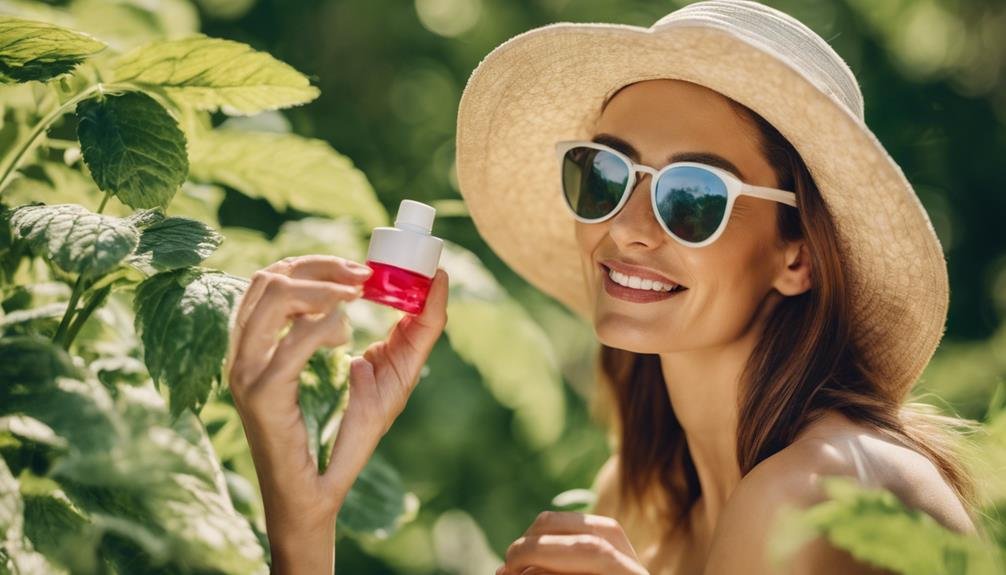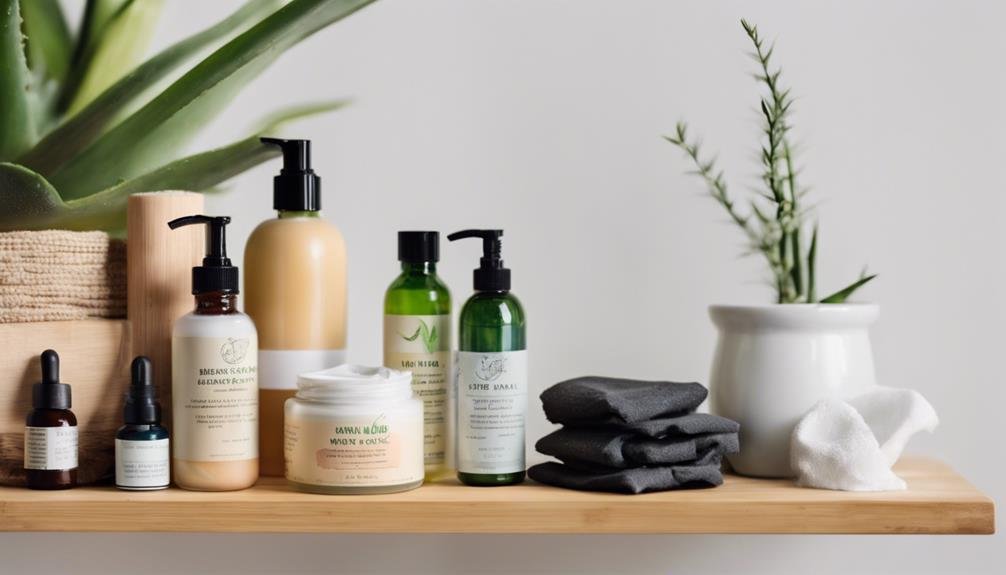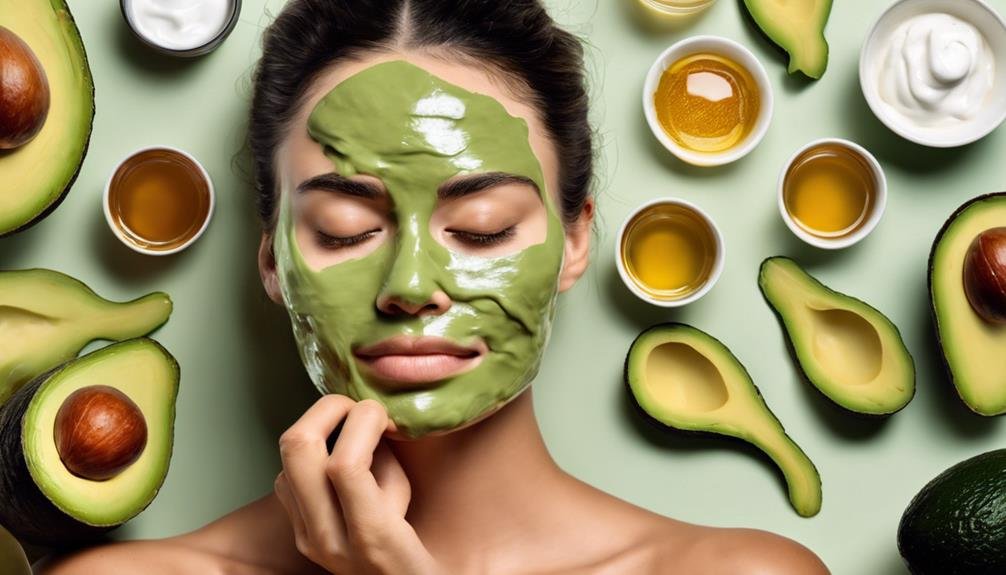To enhance your skin health naturally, consider the power of what you put on your plate. Incorporating certain foods can provide your skin with essential nutrients, but there's more to it than just diet. What other factors might influence your skin's well-being? Stay tuned to discover actionable steps that can help you achieve a radiant complexion without the need for harsh chemicals or excessive treatments.
Nutrient-Rich Diet
To maintain optimal skin health, incorporating a nutrient-rich diet is essential. Superfoods for skin play a crucial role in providing the necessary nutrients to keep your skin vibrant and healthy. These superfoods include fruits like berries, which are rich in antioxidants such as vitamin C and polyphenols. Antioxidants are vital for protecting the skin against damage caused by free radicals, thereby promoting skin health and a youthful appearance.
In addition to berries, vegetables like kale and spinach are also excellent superfoods for the skin due to their high antioxidant content. These leafy greens contain vitamins A, C, and E, which help in maintaining skin elasticity and promoting collagen production.
Nuts and seeds are another great source of antioxidants that can benefit your skin. Incorporating almonds, walnuts, and flaxseeds into your diet can provide essential fatty acids and antioxidants that support healthy skin.
Hydration Is Key
Ensuring adequate hydration is fundamental for maintaining healthy skin. Proper water intake is vital for keeping your skin hydrated from the inside out. Drinking enough water helps to flush out toxins, maintain skin elasticity, and promote a healthy complexion. In addition to water intake, incorporating hydrating foods into your diet can further support skin health. Foods like cucumbers, watermelon, and leafy greens are not only delicious but also help to increase your overall hydration levels.
To help you make more informed choices, here is a table showcasing some hydrating foods that you can easily include in your diet:
| Hydrating Foods | Water Content (%) | Benefits |
|---|---|---|
| Cucumbers | 96 | Rich in antioxidants |
| Watermelon | 92 | High in vitamins A & C |
| Spinach | 91 | Packed with iron & vitamins |
Sun Protection Practices
Proper sun protection practices are essential for maintaining healthy skin and preventing sun damage. When it comes to protecting your skin from harmful UV rays, consider the following tips:
- Wear Protective Clothing: Opt for clothing that covers your skin, such as long sleeves, hats, and sunglasses to shield yourself from the sun's rays.
- Apply Sunscreen: Use a broad-spectrum sunscreen with an SPF of 30 or higher, and remember to reapply every two hours or more frequently if swimming or sweating.
- Seek Shade: Take regular breaks in the shade, especially during peak sun hours between 10 a.m. and 4 p.m.
- Use Umbrellas or Sunshades: When outdoors, seek shelter under umbrellas or sunshades to reduce direct sun exposure.
- Plan Outdoor Activities Wisely: Schedule outdoor activities in the early morning or late afternoon when the sun's rays are less intense.
Regular Exercise Benefits
Engaging in regular exercise offers numerous benefits for overall health and skin vitality. Fitness benefits derived from consistent physical activity extend beyond weight management and cardiovascular health. When you engage in workout routines, you enhance blood flow, which carries oxygen and nutrients to your skin cells, aiding in skin repair and renewal.
Additionally, exercise promotes the production of natural oils that help keep your skin supple and hydrated.
The sweat produced during your workout helps to flush out toxins from your skin, reducing the likelihood of breakouts and blemishes. Regular exercise also boosts collagen production, improving skin elasticity and reducing the appearance of wrinkles.
Moreover, the endorphins released during physical activity help reduce stress levels, which can have a positive impact on your skin by minimizing stress-related skin issues like acne and eczema.
Incorporating exercise into your routine not only enhances your fitness but also contributes to glowing, healthy skin. So, next time you're debating whether to hit the gym, remember the dual benefits it offers for your overall well-being and skin health.
Stress Management Techniques
To effectively manage stress and promote optimal skin health, it's essential to incorporate stress management techniques into your daily routine. Stress can have a significant impact on your skin, leading to issues like acne, eczema, and premature aging. By integrating mindfulness practices and breathing exercises into your day, you can effectively reduce stress levels and improve the overall health of your skin.
- Mindfulness Practices: Engage in activities like meditation or yoga to promote relaxation and reduce stress levels.
- Deep Breathing Exercises: Practice deep breathing techniques to calm your mind and body, promoting better skin health.
- Mindful Eating: Pay attention to what you eat and how it affects your body, making healthier choices to support your skin.
- Nature Walks: Spend time outdoors in nature to unwind and reduce stress, benefiting both your mind and skin.
- Journaling: Write down your thoughts and feelings to help process emotions and alleviate stress, ultimately benefiting your skin's health.
Quality Sleep Habits
To optimize your skin's health and further enhance your well-being, the foundation of quality sleep habits can't be overlooked.
Maintaining a consistent sleep schedule is key in supporting skin health. Aim for 7-9 hours of quality sleep each night to allow your skin time to repair and regenerate.
Establishing a bedtime routine can signal to your body that it's time to wind down, promoting better sleep quality. Incorporate calming activities like reading, gentle stretching, or meditation before bed to relax your mind and body.
Research shows that inadequate sleep can lead to increased signs of skin aging, such as fine lines, wrinkles, and uneven skin tone. By prioritizing quality sleep habits, you not only support your skin's health but also improve your overall well-being.
Natural Skincare Products
For optimal skin health, incorporating natural skincare products into your daily routine can provide numerous benefits. Natural products are gentle on your skin and often free from harsh chemicals that can cause irritation or sensitivity. When looking to enhance your skincare routine, consider the following:
- Homemade remedies: Utilizing ingredients like honey, yogurt, or oatmeal can offer nourishing benefits to your skin without the use of synthetic additives.
- Herbal extracts: Ingredients such as green tea, chamomile, or aloe vera are known for their soothing and antioxidant properties, which can help protect and rejuvenate your skin.
- Organic oils: Incorporating oils like coconut, jojoba, or argan can provide hydration and nourishment to keep your skin looking healthy and radiant.
- Essential oils: Certain essential oils like lavender, tea tree, or rosehip oil can offer aromatherapy benefits while also providing skincare benefits.
- Clay masks: Clay masks made from natural clays like kaolin or bentonite can help detoxify and purify your skin, leaving it refreshed and revitalized.
Gentle Cleansing Routine
Achieving healthy skin starts with a gentle cleansing routine that effectively removes impurities without stripping away essential oils. Proper exfoliation is key to maintaining a radiant complexion. Choose a gentle exfoliator with natural ingredients like oatmeal or sugar to slough off dead skin cells, revealing fresh skin underneath.
Incorporating a facial massage into your cleansing routine can help improve circulation and lymphatic drainage, promoting a youthful glow. Use gentle, circular motions with your fingertips or a facial cleansing brush to stimulate blood flow and relax facial muscles.
When cleansing your skin, opt for a mild cleanser that suits your skin type. Avoid harsh chemicals that can cause irritation and disrupt your skin's natural balance. After cleansing, follow up with a hydrating toner and a nourishing moisturizer to lock in moisture and keep your skin supple. Remember, a gentle cleansing routine sets the foundation for healthy, glowing skin.
DIY Face Masks
Enhance your skincare routine with DIY face masks, a cost-effective and natural way to nourish and revitalize your skin. Making your own face masks allows you to control what ingredients you use, ensuring they're free from harmful chemicals and tailored to your skin's specific needs.
- Ingredient sourcing: Choose fresh, organic ingredients for your DIY face masks to maximize their effectiveness.
- Application techniques: Apply the mask evenly to clean skin, avoiding the delicate eye area. Leave it on for the recommended time before gently rinsing off with warm water.
- Consistency is key: Incorporate DIY face masks into your skincare routine regularly to see the best results.
- Experiment with different recipes: Try out various combinations of natural ingredients to find what works best for your skin type.
- Customize for your skin: Adjust the ingredients in your DIY face masks based on your skin concerns, whether it be hydration, acne-fighting, or brightening properties.
Frequently Asked Questions
Can Certain Foods Worsen Skin Conditions?
Yes, certain foods can worsen skin conditions. Sugar's impact can lead to inflammation and breakouts. Dairy, linked to acne, may exacerbate skin issues. Monitoring your diet and reducing these triggers can help improve your skin health.
How Much Water Should I Drink for Better Skin?
To maintain healthy skin, ensure adequate hydration levels by drinking at least eight 8-ounce glasses of water daily. Remember, "water is life." Proper water intake helps your skin stay hydrated, improving its elasticity and overall appearance.
Should I Apply Sunscreen Indoors?
You should apply sunscreen indoors because harmful UV rays can penetrate windows. While indoor exposure is lower, consistent use can prevent long-term damage. Sunscreen effectiveness doesn't diminish indoors, so make it a daily habit for healthy skin.
Is Sweating During Exercise Good for Skin?
Feeling unsure about sweating during exercise? Don't fret! Skin hydration improves as you sweat, releasing toxins and boosting circulation. Exercise benefits your skin by promoting collagen production, leading to a healthy, radiant complexion.
Can Lack of Sleep Affect Skin Health?
Lack of sleep disrupts your skin's natural regeneration process, impacting its health. Poor sleep patterns lead to decreased collagen production, increased inflammation, and impaired skin barrier function. Prioritize quality sleep to support optimal skin health and rejuvenation.
Conclusion
Incorporating nutrient-rich foods, staying hydrated, practicing sun protection, exercising regularly, managing stress, prioritizing quality sleep, and using natural skincare products are all essential for boosting skin health. For example, Sarah, a busy working mom, noticed a significant improvement in her skin's appearance after following these natural skin health tips. By making small changes to her daily routine, she was able to achieve a glowing complexion and feel more confident in her own skin.







